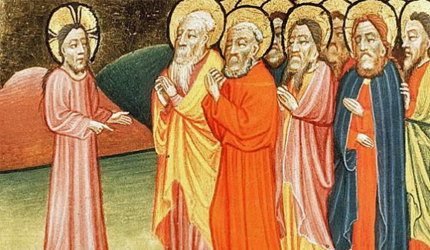Above, a scripturally accurate depiction of “The Twelve” with their identity’s obscured.
Biblical Inerrancy and the 14 Disciples of Jesus
A journal entry by Amazon4God posted on Thursday, January 13 2013 @ 01:56:12 EST Originally posted on christdot.org.
Many people believe that the Bible is the inerrant Word of God. While this belief ranges from those who believe that this inerrancy is limited to the original autographs, others believe that the Scriptures that we have in the canon today are also inerrant and that only our interpretations can be wrong.
Since we have four gospel accounts of the life of Jesus, and Scripture is the only authority for interpreting Scripture it makes sense to look in the gospels for contradictions.
It may come as a surprise to realize that there are fourteen names listed as members of “The Twelve”. In short, the list in Mark and Matthew differs from the list of “The Twelve” in Luke/ Acts. (John has no list of names.)
Here is the list in Mark 3:14-19:
Simon Peter
James the son of Zebedee
John the Brother of James — Sons of Thunder
Andrew
Philip
Bartholomew
Matthew
Thomas
James the son of Alphaeus
Judas Iscariot
THADDAEUS
SIMON THE CANANAEAN
And Matthew 10: 2-4 is similar
Simon Peter
James the son of Zebedee
John, the brother of James
Andrew, Simon Peter’s brother
Philip
Bartholomew
Matthew the tax collector
Thomas
James the son of Alphaeus
Judas Iscariot
LEBBAEUS CALLED THADDAEUS
SIMON THE CANANAEAN
Here is the different list found in Luke 6:12
Simon Peter
James
John
Andrew Simon’s Brother
Philip
Bartholomew
Matthew
Thomas
James the son of Alphaeus
Judas Iscariot
SIMON THE ZEALOT
JUDAS, SON OF JAMES
And Acts 1:12 agrees with Luke (it is the same author)
Peter
James
John
Andrew
Philip
Bartholomew
Matthew
Thomas
James the son of Alphaeus
SIMON THE ZEALOT
JUDAS SON OF JAMES
It is impossible to reconcile the names on these two lists to twelve men.
Thaddaeus/ Lebbaeus is not Judas son of James, since this “son” clarifier was probably added by Luke in order to distinguish Judas the Son of James from Judas Iscariot.
In the same way, a Zealot was a Jew who claimed that Israel was his rightful home. A Zealot would never go by the identifier of “The Cananaean.” Thus Simon the Cananaean must be a different person than Simon the Zealot.
So how could this have happened? How could there be fourteen names listed as “The Twelve”?
The answer is that “The Twelve” was a rhetorical device used by Jesus to symbolize the twelve tribes of Israel. (This is why the names are all male.) “The Twelve” are typically described as misunderstanding Jesus.
So if “The Twelve” was not limited to twelve specific men, we come to the question.
Is the Bible that we have today fallible or are some of our interpretations of what we actually find in the Bible inaccurate?


I admit when I originally wrote this many years ago, it was in frustration with the Christdot website. Imagine a forum in which hundreds of Christians, (who interpreted the scriptures literally and viewed them as completely without error), argued theology without any regard for the findings of Biblical criticism.
This post stayed in their top 10 most read posts for months. It was read by thousands. It was a crash course in the fact that what many Christians believe to be “truth” from the Bible (For example, a clear cut and agreed upon list of 12 disciples) was not always quite so clear cut as they thought that it was.
The comments that were posted on this article, even were up on the later wikipedia article entry, but were edited and changed:
http://en.wikipedia.org/wiki/12_Disciples
Many people note that some scholars do not agree with the list harmonization that must be done across the gospels in order to come up with only 12 male individuals who were the companions of Jesus.
And what if there were more than 12 disciples? Would that mean that leadership and authority in the early Church were not limited to a small group of men who were placed in authority over everyone else? Could leadership possibly have been opened to more than 12 people? What if they were not all men?
Hmm… that is starting to sound like some good news to me.
Well I find more interesting is that I found this page after trying to rectify the fact that 14 locations are listed in the first chapter of acts as locations that there were people who heard their own language spoke on the day of Pentecost. Not 12 locations so either it was the 12 apostles in a couple of them did double duty on language usage, Or supernaturally people hurt their own language regardless of how many people are speaking.